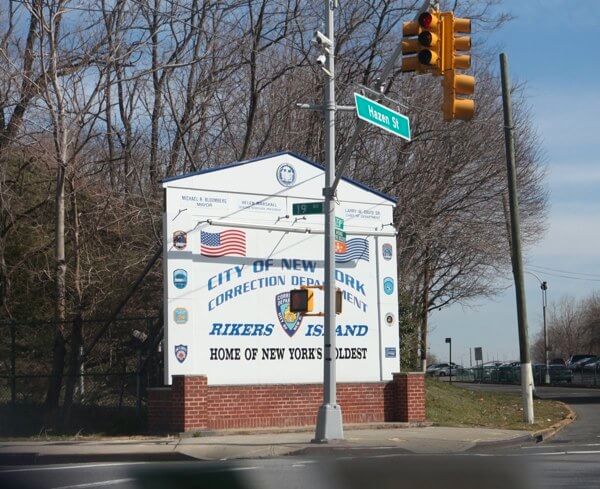By Bill Parry
When a blue-ribbon panel released its 146-page report Sunday recommending an “achievable plan” to permanently close Rikers Island and establish five jail facilities in each of the five boroughs, one law enforcement official was noticeably absent from the press event at John Jay College. Queens District Attorney Richard Brown was not present as former Chief Judge Joseph Lippman presented the findings of his commission’s year-long study. The study was supported by Mayor Bill de Blasio last Friday, after he offered strenuous opposition to the plan during testimony to the panel last October.
“It would cost the city billions of dollars in demolition and construction costs and wreak havoc upon the City’s neighborhoods as new jails are built in residential areas,” Brown said during his testimony. “Witness, for example, the attempt to convert a hotel into a homeless shelter in Maspeth, which the city has had to partly abandon due to widespread, vehement protests on the part of the community. That scene would be replayed all over the city if jails are proposed for residential neighborhoods. Rather than close Rikers altogether, it makes far more sense to modernize it than waste a fortune destroying it and building new jail facilities. While it would require an initial one-time investment to renovate the existing facilities, it’s an investment well-spent in the long run.”
The Independent Commission on NYC Justice and Incarceration Reform is comprised of 27 leaders from a variety of backgrounds, including law enforcement, academia, advocacy groups, business and those who have spent time behind bars. The commission was formed at the request of City Council Speaker Melissa Mark Viverito (D-Manhattan) in April 2016 and evaluated model programs and practices from across the country and around the world and included in-depth research and robust public engagement.
“With the facts as our guide and input from a wide range of elected officials, community leaders and everyday New Yorkers, we have determined, in no uncertain terms, the time has come for us to close Rikers,” Lippman said. “Closing Rikers is an essential step toward a more effective and more humane criminal justice system and our commission’s charge was to develop a blueprint for how we can achieve just that. Our report builds from a solid foundation of progress in which New York City has successfully driven down crime and incarceration rates, illustrating that more jail in no way leads to greater public safety.”
The mayor was against the plan before he was for it. Last year, the mayor called the notion of closing Rikers Island a “noble idea” but one too expensive to consider.
“We had to do a lot of work to figure out a path that actually could achieve this goal,” de Blasio said. “And my feeling in the beginning was — if I didn’t believe it could be done, I wasn’t going to say it couldn’t be done. I had to honestly go through all the paces to say, ‘what would it look like, how long would it take?’ ”
After several meetings last week with the speaker and Lippman, the mayor agreed to a 10-year timeline, provided the city’s prison population could be lowered to 5,000. Numerous reforms by the administration has reduced the Rikers population 23 percent since the mayor took office. Overall, the drop in all city-held has been 18.4 percent, from an average of 11,478 in December 2013 to an average of 9,362 this month.
City Councilman Rory Lancman (D-Hillcrest), the chairman of the Courts & Legal Services Committee, called on the mayor to implement key criminal justice reforms to make closing the complex a reality.
“Closing Rikers Island is an important goal and I commend the Speaker and Judge Lippman for bringing the mayor to this conclusion,” Lancman said. “But it requires a serious analysis of how we get from here to there, and the commitment from the mayor to do things that the city itself can do to lower incarceration: reforming our bail system, expanding adolescent diversion programs, filling judicial vacancies that create a backlog of cases in criminal courts, and fundamentally ending broken windows policing.”
City Councilman Daniel Dromm (D-Jackson Heights) was one of the first elected officials to call for the closure of the notorious prison complex.
“For too long, Rikers Island has been a black hole for human rights,” he said. “Rikers Island’s culture of violence remains a constant threat to the well-being of both correction officers and the incarcerated. It has become all that is wrong with our criminal justice system.”
The mayor, who is up for reelection this fall, has also seen a grassroots “Close Rikers” movement grow rapidly since the suicide of Kalief Browder in 2015 after a harrowing three-year ordeal at Rikers Island, much of it in solitary confinement. The 16-year-old suffered frequent beatings by guards and inmates without ever being charged — all because his family couldn’t afford the $3,000 bail.
In September more than 1,000 protesters marched through Astoria to a rally at the bridge to Rikers. The event featured celebrity speakers such as entrepreneur and hip-hop mogul Russell Simmons and R&B singer John Legend.
The event was organized by former Rikers inmate Glenn Martin, the founder of JustLeadershipUSA, which represents 130 organizations and thousands of New Yorkers. Martin was also a member of Lippman’s commission.
“For too long, New Yorkers — especially poor people of color — have languished in this grist mill, where human rights abuses are routine,” Martin said. “Countless failed attempts at incremental reform have proven that the only viable solution is to close Rikers. As someone who served time at Rikers and who has a brother suffering there now, today’s news is especially meaningful to me. Mayor de Blasio has finally heard the demands of the #CLOSErikers campaign, and we thank him for recognizing that the problem with Rikers is Rikers.”
Reach reporter Bill Parry by e-mail at bparr





































